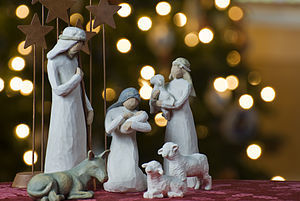Kevin DeYoung's Blog, page 30
December 22, 2016
Yes and Amen in Christ
 God has promised us everything in Christ.
God has promised us everything in Christ.
Abraham knew the Lord as a promise-maker, Moses knew him as a promise-keeper, but we know the one in whom all the promises are yes and Amen.
In Christ, there is now no condemnation for us (Rom. 8:1)
In Christ we did not receive a spirit of slavery to fall back into fear, but a spirit of adoption by which we cry out, “Abba, Father!” (Rom. 8:16)
In Christ the sufferings of this present time are not worth comparing with the glory that is to be revealed (Rom. 8:18).
In Christ we know that he who did not spare his own son, but freely gave him up for us all, will also with him freely give us all things (Rom. 8:32).
In Christ there is nothing in all creation—neither life nor death, nor angels nor principalities, nor things present nor things to come, nor powers, nor height nor depth, nor any other created thing–that can separate us from the love of God (Rom. 8:38-39).
All of the promises are yes and Amen in Christ.
Think of all that the people waited for and did not see–all the fulfillment that they kept longing for, hoping for, waiting for. And think of every good thing that came true on Christmas day.
At last, there was one born of the seed of the woman, a boy who would set everything right.
He would crush the head of the serpent.
He would be Abraham’s offspring, descendant from the tribe of Judah, heir to the throne of David, born of a virgin, born in Bethlehem, preceded by the messenger of the covenant, a prophet like Moses, a priest like Melchizedek and a king like David.
He entered Jerusalem on a donkey, just as the prophets had said.
He was betrayed by his friends.
He was sold for 30 pieces of silver and accused by false witnesses.
He was stricken, smitten and afflicted.
He was hated without cause, crucified with transgressors, buried by the rich in his death.
He was pierced for our transgressions and wounded for our iniquities.
He was buried in a tomb and he rose from the dead on the third day according to the Scriptures.
All promises. And all true. Because of what we celebrate this week.
Merry Christmas!
Save
December 19, 2016
An End-of-Year Marriage Check-Up
 As we approach the end of the year, many of us will take time to reflect on different areas in our lives. There is nothing magical about the turn of the calendar page. Yet if the flip from December to January causes us to think about what’s really important, I’m all for this little bit of common grace.
As we approach the end of the year, many of us will take time to reflect on different areas in our lives. There is nothing magical about the turn of the calendar page. Yet if the flip from December to January causes us to think about what’s really important, I’m all for this little bit of common grace.
Some of us will put together new exercise goals. Some of us will find the right Bible reading plan for next year. Some of us will zero in on a new schedule for Bible memorization. All of these are important (especially the last two). Let me suggest one other plan for the end of the year: check in on your marriage.
As a pastor, I’ve seen too many marriages flounder (or fall apart) over the years. The church usually is good about rallying around a couple for sympathy, counsel, and comfort in the midst of marital trials. What we may not be as good at is helping each other before the problems become acute. We need a place for marital triage in the church, but we also need regular check-ups.
Here are 15 questions to help you and your spouse take the relational temperature of your marriage:
1. How often do we laugh together?
2. When is last time we had a meaningful conversation about something other than our schedules or the kids?
3. Do we ever turn on music and sing and dance and act silly?
4. How many times in the last month have we prayed together or read the Bible together?
5. Do we ever hold hands?
6. Has our physical intimacy grown cold, infrequent, or a source of too much pressure and stress?
7. When is the last time we said “I’m sorry” or “I forgive you”?
8. When is the last time we said “Thank you” for regular, ordinary task like making dinner, doing the dishes, paying the bills, fixing the car, or folding the laundry?
9. When is the last time we (cheerfully!) said, “How can I help you this week” (and meant it)?
10. When is the last time we surprised each other with a gift, a note, or a night out?
11. Have we raised our voices at one another in the last month?
12. Are we more eager to spend time with someone at work, at church, or at the gym than we are with each other?
13. When we have time together at home, just the two of us, is the television always on in the background?
14. Are there hurts or sins or fears that we need to disclose to one another?
15. How might the love of God the Father, the grace of our Lord Jesus Christ, and the fellowship of the Holy Spirit shape our life together in this season of marriage?
Not a perfect list of questions, certainly not an exhaustive list. But perhaps it’s a start. God’s grace flows best in marriage when we are talking together.
An End of Year Marriage Check Up
 As we approach the end of the year, many of us will take time to reflect on different areas in our lives. There is nothing magical about the turn of the calendar page. And yet, if the flip from December to January causes us to think about what’s really important, I’m all for this little bit of common grace.
As we approach the end of the year, many of us will take time to reflect on different areas in our lives. There is nothing magical about the turn of the calendar page. And yet, if the flip from December to January causes us to think about what’s really important, I’m all for this little bit of common grace.
Some of us will put together new exercise goals. Some of us will find the right Bible reading plan for next year. Some of us will zero in on a new schedule for Bible memorization. All of these are important (especially the last two). Let me suggest one other plan for the end of the year: check in on your marriage.
As a pastor, I’ve seen too many marriages flounder (or fall apart) over the years. The church usually is good about rallying around a couple for sympathy, counsel, and comfort in the midst of marital trials. What we may not be as good at is helping each other before the problems become acute. We need a place for marital triage in the church, but we also need regular check-ups.
Here are 15 questions to help you and your spouse take the relational temperature of your marriage:
1. How often do we laugh together?
2. When is last time we had a meaningful conversation about something other than our schedules or the kids?
3. Do we ever turn on music and sing and dance and act silly?
4. How many times in the last month have we prayed together or read the Bible together?
5. Do we ever hold hands?
6. Has our physical intimacy grown cold, infrequent, or a source of too much pressure and stress?
7. When is the last time we said “I’m sorry” or “I forgive you”?
8. When is the last time we said “Thank you” for regular, ordinary task like making dinner, doing the dishes, paying the bills, fixing the car, or folding the laundry?
9. When is the last time we (cheerfully!) said, “How can I help you this week” (and meant it)?
10. When is the last time we surprised each other with a gift, a note, or a night out?
11. Have we raised our voices at one another in the last month?
12. Are we finding ourselves more eager to spend time with someone at work, at church, or at the gym than we are with each other?
13. When we have time together at home, just the two of us, is the television always on in the background?
14. Are there hurts or sins or fears that we need to disclose to one another?
15. How might the love of God the Father, the grace of our Lord Jesus Christ, and the fellowship of the Holy Spirit shape our life together in this season of marriage?
Not a perfect list of questions, certainly not an exhaustive list. But, perhaps it’s a start. God’s grace flows best in marriage when we are talking together.
December 18, 2016
Monday Morning Music
December 14, 2016
10 Ways to Be a Christian this Christmas
And that means many of us are tired, frazzled, stressed, and busy. The next few weeks will go by in a blur—from family, to church, to food, to family, to football, back to church, back to family, back to food, and then back to work.
We love Christmas. We can’t wait for the day to come, and many of us can’t wait for the season to be gone.
But whether you love every nook and cranny about the holidays—or consider most of it “noise, noise, noise!”—there is no excuse to be grinchy and scroogeish. Here are ten ways we can remember to be Christians this Christmas.
1. Sing like you mean it. Sure, there are a some Christmas carol clunkers, but there are some amazing hymns too (see Hark! the Herald Angels Sing, Of the Father’s Love Begotten, Let All Mortal Flesh, and many more). Belt them out with gusto. Smile and take delight in the familiar sounds of the season. You may not hear them for 11 more months.
2. Say thank you. Over the next week you’ll get gifts someone picked out for you, and eat food someone prepared for you, and enjoy hospitality someone laid out for you. We’re told to give thanks in all circumstances (1 Thess. 5:18). Surely, this includes Christmas. Stop to offer a sincere “thank you” to your mom, your husband, your kids, your aunt, your grandma, whomever—it will be good for your soul, and it may just make their day.
3. Put the phone down. Go ahead and take a few pictures and post a few updates, but let’s not turn our Christmas experience into another commodity for mass consumption. Look people in the eye. Be present in the moment. Let the world’s tragedies and scandals and funny monkey videos take a back seat for a day.
4. Enjoy some cookies. Oh, the dreadful holiday pounds. Sure, we need to be on guard against gluttony. But we need to be on guard against censorious asceticism too. God created food to be received with thanksgiving. Eat up and don’t feel bad about it. For everything created by God is good, and nothing is to be rejected that is made holy by the Word of God and prayer (1 Tim. 4:3-5).
5. Talk to your family. Why not put in five minutes worth of thought on the way to your grandma’s house to think of five questions? Maybe conversation flows easily with your family. But for many people, it takes some effort to engage our relatives, especially those we don’t see often and those with whom we have little in common. Give people the gift of your curiosity.
6. Find time to be quiet. At some point, get away and be still. Even if just for 10 minutes. Even if it’s in your bed after everyone else is asleep. Go on a walk. Take a long shower. Get up early. Sit in the dark. Look at the snow. Stare at the tree. Just be quiet, ponder, and pray.
7. Pray for opportunities. What if we prayed for at least one opportunity in the next two weeks to share the gospel? I bet God would honor that prayer. Maybe we can talk to a friend or family member. Maybe we’ll find a surprisingly open door for conversation at the mall, or out to eat, or on the plane. Maybe we have not because we ask not.
8. Make a year-end gift. Your church is probably trying to make budget. So are rescue missions, crisis pregnancy centers, Christian schools, mission agencies, and dozens of other kingdom causes. Go ahead a be generous. We won’t out-give God.
9. Quit complaining. Something will go wrong this Christmas. Someone will hurt your feelings. Your parent’s house will be too hot. Your brother’s house will be too cold. A meal will be barely edible. Your obnoxious friends will be extra obnoxious. Still, God is more pleased with gratitude than with grumbling. If we learn to overlook a few offenses we’ll be happier too.
10. Rejoice to hear the Story one more time. Matthew 1 and Luke 2 are coming at you. So are Isaiah 7 and Isaiah 9, Micah 5, and many of the same passages you hear ever year. No bother: “To write the same things to you is no trouble to me and is safe for you” (Phil. 3:1). Let us pray that God gives us ears to hear, again and again, with fresh wonder that God came down to be with us, and that he is with us still.
10 Ways to be a Christian this Christmas
And that means many of us are tired, frazzled, stressed, and busy. The next few weeks will go by in a blur–from family, to church, to food, to family, to football, back to church, back to family, back to food, and then back to work.
We love Christmas. We can’t wait for the day to come, and many of us can’t wait for the season to be gone.
But whether you love every nook and cranny about the holidays–or consider most of it “noise, noise, noise!”–there is no excuse to be grinchy and scroogeish. Here are ten ways we can remember to be Christians this Christmas.
1. Sing like you mean it. Sure, there are a some Christmas carol clunkers, but there are some amazing hymns too (see Hark! the Herald Angels Sing, Of the Father’s Love Begotten, Let All Mortal Flesh, and many more). Belt them out with gusto. Smile and take delight in the familiar sounds of the season. You may not hear them for eleven more months.
2. Say thank you. Over the next week you’ll get gifts someone picked out for you, and eat food someone prepared for you, and enjoy hospitality someone laid out for you. We’re told to give thanks in all circumstances (1 Thess. 5:18). Surely, this includes Christmas. Stop to offer a sincere “thank you” to your mom, your husband, your kids, your aunt, your grandma, whomever–it will be good for your soul and it may just make their day.
3. Put the phone down. Go ahead and take a few pictures and post a few updates, but let’s not turn our Christmas experience into another commodity for mass consumption. Look people in the eye. Be present in the moment. Let the world’s tragedies and scandals and funny monkey videos take a back seat for a day.
4. Enjoy some cookies. Oh, the dreadful holiday pounds. Sure, we need to be on guard against gluttony. But we need to be on guard against censorious asceticism too. God created food to be received with thanksgiving. Eat up, and don’t feel bad about it. For everything created by God is good, and nothing is to be rejected that is made holy by the word of God and prayer (1 Tim. 4:3-5).
5. Talk to your family. Why not put in five minutes worth of thought on the way to your grandma’s house to think of five questions? Maybe conversation flows easily with your family. But for many people, it takes some effort to engage our relatives, especially those we don’t see often and those with whom we have little in common. Give people the gift of your curiosity.
6. Find time to be quiet. At some point, get away and be still. Even if just for 10 minutes. Even if it’s in your bed after everyone else is asleep. Go on a walk. Take a long shower. Get up early. Sit in the dark. Look at the snow. Stare at the tree. Just be quiet, ponder, and pray.
7. Pray for opportunities. What if we prayed for at least one opportunity in the next two weeks to share the gospel? I bet God would honor that prayer. Maybe we can talk to a friend or family member. Maybe we’ll find a surprisingly open door for conversation at the mall, or out to eat, or on the plane. Maybe we have not because we ask not.
8. Make a year-end gift. Your church is probably trying to make budget. So are rescue missions, crisis pregnancy centers, Christian schools, mission agencies, and dozens of other kingdom causes. Go ahead a be generous. We won’t out-give God.
9. Quit complaining. Something will go wrong this Christmas. Someone will hurt your feelings. Your parent’s house will be too hot. Your brothers house will be too cold. A meal will be barely edible. Your obnoxious friends will be extra obnoxious. Still, God is more pleased with gratitude than with grumbling. If we learn to overlook a few offenses we’ll be happier too.
10. Rejoice to hear the Story one more time. Matthew 1 and Luke 2 are coming at you. So are Isaiah 7 and Isaiah 9, Micah 5, and many of the same passages you hear ever year. No bother: “To write the same things to you is no trouble to me and is safe for you” (Phil. 3:1). Let us pray that God gives us ears to hear, again and again, with fresh wonder that God came down to be with us, and that he is with us still.
December 12, 2016
Top Ten Books of 2016
 This list is not meant to assess the thousands of Christian books published each year, let alone every interesting book published in 2016. There are dozens of worthy titles I don’t have time to check out (and scores of other good books I’ve not hear of). This is simply a list of the books (Christian and non-Christian, but all non-fiction) that I thought were the best in the past year.
This list is not meant to assess the thousands of Christian books published each year, let alone every interesting book published in 2016. There are dozens of worthy titles I don’t have time to check out (and scores of other good books I’ve not hear of). This is simply a list of the books (Christian and non-Christian, but all non-fiction) that I thought were the best in the past year.
When I say “best” I have several questions in mind:
• Did I learn something valuable?
• Was the book personally challenging, illuminating, or edifying?
• Is it a book I am likely to reread or consult again?
• Do I see myself recommending this book to others?
Undoubtedly, the “best” books reflect my interests and inklings. This doesn’t mean I agree with every point in all these books, but it does mean I found them helpful and insightful. There is nothing scientific about my list, but here it goes:
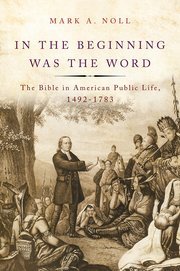 10. Mark A. Noll, In the Beginning Was the Word: The Bible in American Public Life, 1492-1783 (Oxford). I’ve long enjoyed reading Mark Noll. Since I’ve been a doctoral student in history I’ve come to realize that (1) I don’t always agree with Noll’s interpretations (e.g., he is fairly negative about John Witherspoon), and (2) he really is a brilliant historian. Noll’s writing is lucid, and his command of the primary literature is extraordinary. This book is no exception.
10. Mark A. Noll, In the Beginning Was the Word: The Bible in American Public Life, 1492-1783 (Oxford). I’ve long enjoyed reading Mark Noll. Since I’ve been a doctoral student in history I’ve come to realize that (1) I don’t always agree with Noll’s interpretations (e.g., he is fairly negative about John Witherspoon), and (2) he really is a brilliant historian. Noll’s writing is lucid, and his command of the primary literature is extraordinary. This book is no exception.
 9. S. Donald Fortson III and Rollin G. Grams, Unchanging Witness: The Consistent Christian Teaching on Homosexuality in Scripture and Tradition (B&H Academic). Not a page turner, but a necessary reference work. You need a book like this on your shelf, especially as more and more Christians claim this is a tertiary agree-to-disagree issue.
9. S. Donald Fortson III and Rollin G. Grams, Unchanging Witness: The Consistent Christian Teaching on Homosexuality in Scripture and Tradition (B&H Academic). Not a page turner, but a necessary reference work. You need a book like this on your shelf, especially as more and more Christians claim this is a tertiary agree-to-disagree issue.
 8. D.A. Carson, ed., The Enduring Authority of the Christian Scriptures (Eerdman). This massive volume (1200 pages) is not going to be beach reading for most people, but it is extremely valuable nonetheless. Here you have in one book the top flight scholarship on Old Princeton and biblical authority (Seeman), the Old Testament canon (Dempster), Bart Ehrman’s equivocation (Williams), apostolic unity (Gathercole), Jesus’ view of the Old Testament (Blomberg), and the idea of inerrancy (Helm), among thirty other chapters. The final chapter of summarizing FAQs (Carson) deserves to be a stand alone mini-book.
8. D.A. Carson, ed., The Enduring Authority of the Christian Scriptures (Eerdman). This massive volume (1200 pages) is not going to be beach reading for most people, but it is extremely valuable nonetheless. Here you have in one book the top flight scholarship on Old Princeton and biblical authority (Seeman), the Old Testament canon (Dempster), Bart Ehrman’s equivocation (Williams), apostolic unity (Gathercole), Jesus’ view of the Old Testament (Blomberg), and the idea of inerrancy (Helm), among thirty other chapters. The final chapter of summarizing FAQs (Carson) deserves to be a stand alone mini-book.
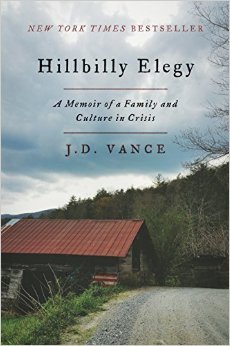 7. J.D. Vance, Hillbilly Elegy: A Memoir of a Family and Culture in Crisis (Harper). Perhaps the most surprising “it” book of the year. Fascinating, sad, sobering, and insightful. The book holds your attention and makes you think. That’s what good books should do.
7. J.D. Vance, Hillbilly Elegy: A Memoir of a Family and Culture in Crisis (Harper). Perhaps the most surprising “it” book of the year. Fascinating, sad, sobering, and insightful. The book holds your attention and makes you think. That’s what good books should do.
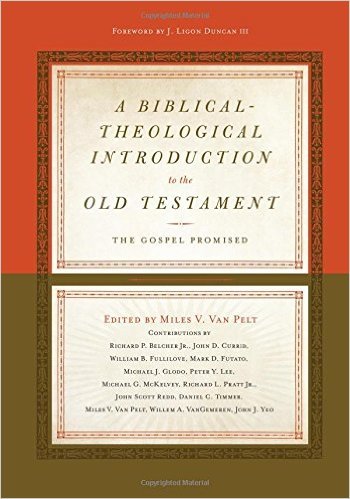 6. Miles V. Van Pelt, ed., A Biblical-Theological Introduction to the Old Testament: The Gospel Promised (Crossway); Michael J. Kruger, ed., A Biblical-Theological Introduction to the New Testament: The Gospel Realized (Crossway). As a pastor I find meaty, scholarly, theologically rich introductions like these to be invaluable. I will consult these volumes before starting any new preaching series on a book of the Bible. Van Pelt and Kruger (and RTS) are to be commended for this excellent resource.
6. Miles V. Van Pelt, ed., A Biblical-Theological Introduction to the Old Testament: The Gospel Promised (Crossway); Michael J. Kruger, ed., A Biblical-Theological Introduction to the New Testament: The Gospel Realized (Crossway). As a pastor I find meaty, scholarly, theologically rich introductions like these to be invaluable. I will consult these volumes before starting any new preaching series on a book of the Bible. Van Pelt and Kruger (and RTS) are to be commended for this excellent resource.
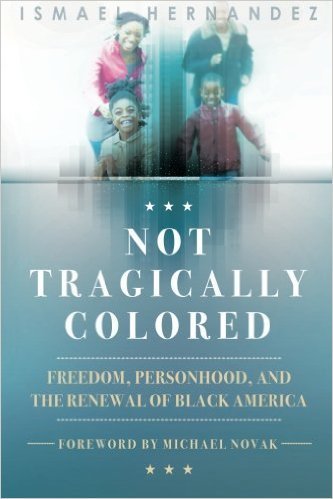 5. Ismael Hernandez, Not Tragically Colored: Freedom, Personhood, and the Renewal of Black America (Acton Institute). I have so much to learn about racial reconciliation and racial tensions that I am constantly on the lookout for good books to help me better grasp the African American experience. This book–written by a Black, Puerto Rican, Catholic conservative–presents a vision for renewal that is opposed to the prescriptions found in much of the “racialist” literature (his term). The gist: “The fact is that one can stand side by side with another person in the binding principle that racism is evil and, at the same time, be far apart in one’s analysis of specific policy and social issues” (147).
5. Ismael Hernandez, Not Tragically Colored: Freedom, Personhood, and the Renewal of Black America (Acton Institute). I have so much to learn about racial reconciliation and racial tensions that I am constantly on the lookout for good books to help me better grasp the African American experience. This book–written by a Black, Puerto Rican, Catholic conservative–presents a vision for renewal that is opposed to the prescriptions found in much of the “racialist” literature (his term). The gist: “The fact is that one can stand side by side with another person in the binding principle that racism is evil and, at the same time, be far apart in one’s analysis of specific policy and social issues” (147).
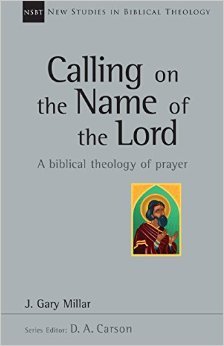 4. J. Gary Millar, Calling on the Name of the Lord: A Biblical Theology of Prayer (IVP). The New Studies in Biblical Theology series (edited by D.A. Carson) has been excellent from start to finish. I must have a dozen volumes already. In this book, Millar–a transplanted Irishman now serving as Principal of Queensland Theological College in Australia–argues that prayer, according to the Bible, is asking God to do what he has already promised to do. We will always need more books on prayer, because God’s people will always need to be stirred up to pray more.
4. J. Gary Millar, Calling on the Name of the Lord: A Biblical Theology of Prayer (IVP). The New Studies in Biblical Theology series (edited by D.A. Carson) has been excellent from start to finish. I must have a dozen volumes already. In this book, Millar–a transplanted Irishman now serving as Principal of Queensland Theological College in Australia–argues that prayer, according to the Bible, is asking God to do what he has already promised to do. We will always need more books on prayer, because God’s people will always need to be stirred up to pray more.
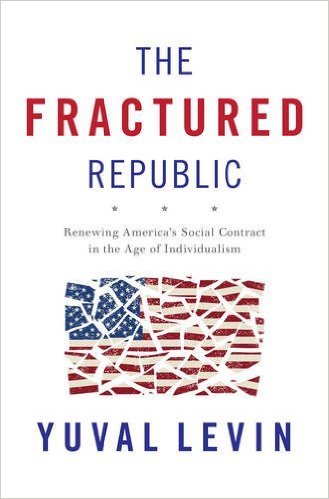 3. Yuval Levin, The Fractured Republic: Renewing America’s Social Contract in the Age of Individualism (Basic Books). Levin, a former White House and congressional staffer and now an editor (National Affairs), a contributing editor (National Review and Weekly Standard), and a Fellow at the Ethics and Public Policy Center, has written an original and thoughtful book that thinkers on both sides of the political aisle should read carefully. Although Levin is a conservative, he faults both the Left and the Right for being “blinded by Nostalgia” and failing to propose meaningful solutions that do more than pedal a narrative of decline and pine for the good old days.
3. Yuval Levin, The Fractured Republic: Renewing America’s Social Contract in the Age of Individualism (Basic Books). Levin, a former White House and congressional staffer and now an editor (National Affairs), a contributing editor (National Review and Weekly Standard), and a Fellow at the Ethics and Public Policy Center, has written an original and thoughtful book that thinkers on both sides of the political aisle should read carefully. Although Levin is a conservative, he faults both the Left and the Right for being “blinded by Nostalgia” and failing to propose meaningful solutions that do more than pedal a narrative of decline and pine for the good old days.
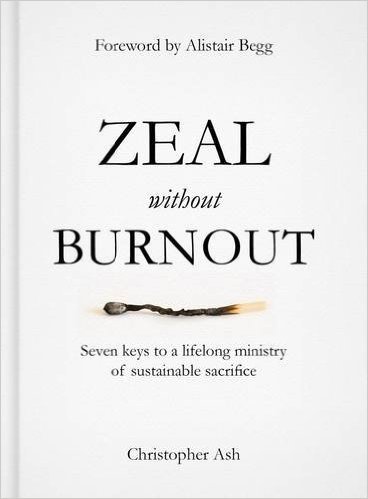 2. Christopher Ash, Zeal without Burnout: Seven Keys to a Lifelong Ministry of Sustainable Sacrifice (The Good Book Company). Read this book over the holidays. It will take less than an hour, and it may save your ministry or the ministry of someone you know. I didn’t read the book because I felt like I was nearing burnout. I read it because I know I could be someday if I’m not careful. Ash offers plenty of personal examples, along with sound biblical advice. “Sustainable sacrifice”–that’s the goal.
2. Christopher Ash, Zeal without Burnout: Seven Keys to a Lifelong Ministry of Sustainable Sacrifice (The Good Book Company). Read this book over the holidays. It will take less than an hour, and it may save your ministry or the ministry of someone you know. I didn’t read the book because I felt like I was nearing burnout. I read it because I know I could be someday if I’m not careful. Ash offers plenty of personal examples, along with sound biblical advice. “Sustainable sacrifice”–that’s the goal.
 1. ESV Reader’s Bible, Six Volume Set (Crossway). Not cheap, but that’s not the goal. This is a simple, yet stunning edition of God’s holy word. The look, the feel, the touch, the font, the paper, the white space–it has all been thought through carefully with the goal of making the Bible an uncluttered delight to read. I love sitting down in my comfy chair in the morning, grabbing one of these volumes off the shelf, and reading the Bible in a new and simpler way. A great gift idea. You won’t be disappointed.
1. ESV Reader’s Bible, Six Volume Set (Crossway). Not cheap, but that’s not the goal. This is a simple, yet stunning edition of God’s holy word. The look, the feel, the touch, the font, the paper, the white space–it has all been thought through carefully with the goal of making the Bible an uncluttered delight to read. I love sitting down in my comfy chair in the morning, grabbing one of these volumes off the shelf, and reading the Bible in a new and simpler way. A great gift idea. You won’t be disappointed.
Want to see previous top ten book winners? Here you go: 2011, 2012, 2013, 2014, 2015.
Save
Save
Save
Save
December 11, 2016
Monday Morning Music
December 7, 2016
Is the Virgin Birth Essential?
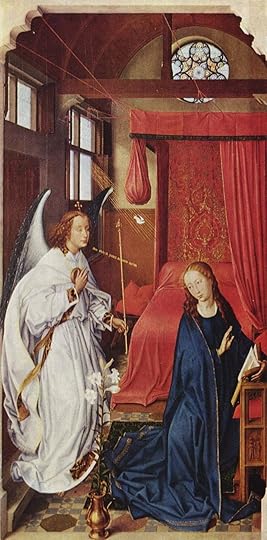
Rogier van der Weyden
The accounts of Jesus’ birth in Matthew (chapter 1) and Luke (chapters 1-2) are clear and unequivocal: Jesus’ birth was not ordinary. He was not an ordinary child and his conception did not come about in the ordinary way. His mother Mary was a virgin, having had no intercourse prior to conception and birth. By the Holy Spirit, Mary’s womb became the cradle of the Son’s incarnation (Matt. 1:20; Luke 1:35).
With God, All Things Are Possible, Or Not?
It’s no secret than in recent history, the doctrine of the virgin birth (or more precisely, the virginal conception) has been ridiculed as fairy-tale make-believe by many outside the church, and by not a few voices inside the church. Two arguments are usually mentioned.
First, the prophecy about a virgin birth in Isaiah 7:14, it is argued, actually speaks of a young woman and not a virgin.
Many have pointed out that the Hebrew word in Isaiah is almah and not the technical term for virgin, bethula. It is true that almah has a wider semantic range than bethula, but there are no clear references in the Old Testament where almah does not mean virgin. The word almah occurs 9 times in the Old Testament and wherever the context makes its meaning clear, the word refers to a virgin. More importantly, the Septuagint translates almah with the Greek word parthenos (the same word used in Matthew 1:23 where Isaiah 7:14 is quoted), and everyone agrees that parthenos means “virgin.” The Jewish translators of the Septuagint would not have used a clear Greek word for virgin if they understood Isaiah 7:14 to refer to nothing more than a young woman.
Second, many have objected to the virgin birth because they see it as a fairly typical bit of pagan mythologizing. “Star Wars has a virgin birth. Mithraism had a virgin birth. Christianity has a virgin birth. Big deal. They are all just fables.” This is a popular argument and it sounds quite plausible as first glance, but there are a number of problems with it.
1. The assumption that there was a proto-typical God-Man who had certain titles, did certain miracles, was born of a virgin, saved his people, and then got resurrected is not well-founded. In fact, no such prototypical “hero” existed before the rise of Christianity.
2. It would have been unthinkable for a Jewish sect (which is what Christianity was initially) to try to win new converts by adding pagan elements to their gospel story. I suppose a good Jew might make up a story to fit the Old Testament, but to mix in bits of paganism would have been anathema to most Jews.
3. The virgin birth parallels are not as strong as we might think. Consider some of the usual suspects.
Alexander the Great: his most reliable ancient biographer (several centuries after his death) makes no mention of a virgin birth. Besides, the story that began to circulate (after the rise of Christianity it’s worth mentioning) is about an unusual conception, but not a virgin birth (Alexander’s parents were already married).
Dionysus: like so many of the pagan “parallels”, he was born when a god (in this case Zeus) disguised himself as a human and impregnated a human princess. This is not a virgin birth and not like the Holy Spirit’s role we read about in the gospels.
Mithra: he’s a popular parallel. But he was born of a rock, not a virgin. Moreover, the cult of Mithra in the Roman Empire dates to after the time of Christ so any dependence is Mithraism on Christianity and not the other way around.
Buddha: his mother dreamed that Buddha entered her in the form of a white elephant. But this story doesn’t appear until five centuries after his death and she was already married.
You get the drift. The so-called parallels always occur well after the life in question, well into the Christian era, and are not really stories of virginal conceptions anyway.
Does It Really Matter?
But even for those who believe in the virgin birth, it is sometimes questioned whether the doctrine is really that important. For example, Rob Bell famously argued over a decade ago that it wouldn’t be such a bid deal if we found out Jesus had an earthly father named Larry. So what if the virgin birth was thrown in to appeal to the followers of Mithra and Dionysian religious cults? What if the word for virgin referred to a child whose mother became pregnant the first time she had intercourse? According to Bell, none of this would be catastrophic to the Christian faith. “What if that spring [the virgin birth] was seriously questioned? Could a person keep jumping? Could a person still love God? Could you still be a Christian? Is the way of Jesus still the best possible way to live?”
There are a lot of questions here, but the underlying one seems to be this: is the virgin birth really that essential to Christianity? The answer is a resounding “Yes!”
First, the virgin birth is essential to Christianity because it has been essential to Christianity.
That may sound like weak reasoning, but only if we care nothing about the history and catholicity of the church. Granted, the church can get things wrong, sometimes even for a long time. But if Christians, of all stripes in all places, have professed belief in the virgin birth for two millennia, maybe we should be slow to discount it as inconsequential. In his definitive study of the virgin birth, J. Gresham Machen concluded that “there can be no doubt that at the close of the second century the virgin birth of Christ was regarded as an absolutely essential part of the Christian belief by the Christian church in all parts of the known world.” Perhaps, then, we should not be so hasty in dismissing the doctrine as a take-it-or-leave-it element of the Christian faith.
Second, the gospel writers clearly believed that Mary was a virgin when Jesus was conceived.
We don’t know precisely how the Christ-child came to be in Mary’s womb, except that the conception was “from the Holy Spirit” (Matt. 1:20). But we do know that Mary understood the miraculous nature of this conception, having asked the angel “How will this be, since I am a virgin?” (Luke 1:34). The gospels do not present the virgin birth as some prehistoric myth or pagan copy-cat, but as “an orderly account” of actual history from eyewitnesses (Luke 1:1-4). If the virgin birth is false, the historical reliability of the gospels is seriously undermined.
Third the virgin birth demonstrates that Jesus was truly human and truly divine.
How can the virgin birth be an inconsequential spring for our jumping when it establishes the very identity of our Lord and Savior? If Jesus had not been born of a human, we could not believe in his full humanity. But if he birth were like any other human birth—through the union of a human father and mother–we would question his full divinity. The virgin birth is necessary to secure both a real human nature and a completely divine nature.
Fourth, the virgin birth is essential because it means Jesus did not inherit the curse of depravity that clings to Adam’s race.
Jesus was made like us in every way except for sin (Heb. 4:15; 7:26-27). Every human father begets a son or daughter with his sin nature. We may not understand completely how this works, but this is the way of the world after the fall. Sinners beget sinners (Psalm 51:5). Always. So if Joseph was the real father of Jesus, or Mary had been sleeping around with Larry, Jesus is not spotless, not innocent, and not perfectly holy. And as result, we have no mediator, no imputation of Christ’s righteousness (because he has no righteousness to impute to us), and no salvation.
So, yes, the virgin birth is kind of essential.
December 5, 2016
Who Was St. Nicholas?
 The unsatisfying answer to the title of this post is that nobody knows for sure. To quote one Nicholas scholar “We can grant a bishop of that name who had a great impact on his homeland. We can also accept December 6 as the day of his death and burial. These are all the facts we can hold to. Further we cannot go.” (Gustav Anrich quoted by Charles W. Jones in Saint Nicholas of Bari, Myra, and Manhattan).
The unsatisfying answer to the title of this post is that nobody knows for sure. To quote one Nicholas scholar “We can grant a bishop of that name who had a great impact on his homeland. We can also accept December 6 as the day of his death and burial. These are all the facts we can hold to. Further we cannot go.” (Gustav Anrich quoted by Charles W. Jones in Saint Nicholas of Bari, Myra, and Manhattan).
According to the best estimates, Nicholas, was born around 280 AD in Patara, in Asia Minor. He later became bishop of Myra in modern day Turkey. Nicholas, it seems, died about 343 on or near December 6.
There is no record of his existence attested in any document until the 6th century. By that time Nicholas, whoever he had been, was already famous. The emperor Justinian dedicated a church to him in Constantinople. Initially, Nicholas was most well known in the East. But by 900, a Greek wrote “The West as well as the East acclaims and glorifies him. Wherever there are people, his name is revered and churches are built in his honor. All Christians reverence his memory and call upon his protection.” In 1087, Italian sailors stole his supposed relics and took them from Myra to Bari, Italy. This greatly increased his popularity in Europe and made Bari one of the most crowded pilgrimage sites. It is said that Nicholas was represented by medieval artists more than any other saint except Mary.
The Man and the Myth
Why was Nicholas so famous? Well, it’s impossible to tell fact from fiction, but this is some of the legend of St. Nicholas:
He was reputed to be a wonder-worker who brought children back to life, destroyed pagan temples, saved sailors from death at sea, and as an infant nursed only two days a week and fasted the other five days.
Moving from probable legend to possible history, Nicholas was honored for enduring persecution. It is said that he was imprisoned during the Empire wide persecution under Diocletian and Maximian. Upon his release and return, the people flocked around him “Nicholas! Confessor! Saint Nicholas has come home!”
Nicholas was also hailed as a defender of orthodoxy. Later sources claim he was in attendance at the council of Nicea. According to tradition, he was a staunch opponent of Arianism. Writing five centuries after his death, one biographer wrote “Thanks to the teaching of St. Nicholas, the metropolis of Myra alone was untouched by the filth of the Arian heresy, which it firmly rejected as a death-dealing poison.” Stories of his courage abound, one claiming that Nicholas traveled to Nicea and, upon arrival, promptly slapped Arius in the face. As the story goes, the rest of the council was shocked and appalled, so much so that they were going to remove Nicholas from his bishopric, that is until Jesus and Mary appeared to defend him. According to the same legend, this apparition changed the minds of the delegates who quickly recanted of their outrage.
As you might have guessed, Nicholas was also revered for being a generous gift giver. Born into a wealth family, he inherited the fortune when his parents died. Apparently he gave his vast fortune away. The most famous story involved three girls who were so destitute that they were going to be forced into a life of prostitution. But Nicholas threw three bags of gold through the window as dowries for the young woman.
Over time, Saint Nicholas became the patron saint of nations like Russia and Greece, cities like Fribourg and Moscow, and of children, sailors, unmarried girls, merchants, and pawnbrokers (the three gold balls hung outside pawn shops are symbolic of the three bags of gold).
Christmas and St. Nicholas
In honor of St. Nicholas the gift giver, Christians began to celebrate December 6 (his feast day) by giving presents. The tradition developed over time. For good boys and girls, St. Nicholas would come in his red Bishop’s robe and fill boots with gifts on the night of December 5. For bad boys and girls St. Nicholas was to be feared. In highly catholic parts of Europe, St. Nicholas became a deterrent to erring young children. In Germany, he was often accompanied by Knecht Ruprecht (farmhand Rupert) who threatened to eat misbehaving children. In Switzerland, St. Nicholas threatened to put wicked children in a sack and bring them back to the Black Forest. In the Netherlands, St. Nicholas’ helper would tie them in a sack and bring them back to Spain. In parts of Austria, the priest, dressed up in Christmas garb, would visit the homes of naughty children and threaten them with rod-beatings. At least nowadays, he only checks his list!
Not surprisingly, the Reformers were less than friendly towards the traditions that had been built up around the saints. Luther rejected the saints’ days, believing they were built upon legends and superstitions (and a virulent strain of moralism we might add). In Germany, Luther replaced Saint Nicholas’ Day with a different holiday, Christ Child, or Christkindl. Ironically, Kriss Kringle which derived from Luther’s Christ Child holiday, has become just another name for St. Nicholas.
From St. Nicholas to Santa Claus
The cult of St. Nicholas virtually disappeared in Protestant Europe, with the exception of one country: the Netherlands. If you love Christmas with all the trappings of Santa Claus and stockings and presents, thank the Dutch. If you despise all that, try to ignore my last name for the time being. The Puritans had done away with St. Nicholas and banned Christmas altogether. But the Dutch held on to their tradition and brought it with them to the New World. In the Netherlands Sint Nicolaas was contracted to Sinterklaas. According to Dutch tradition, Sinterklaas rides a horse and is accompanied by his helper Zwarte Piet, or Black Pete. Many consider Black Pete a racist stereotype derived from slavery, although others claim he is black because he goes down the chimney and gets a face full of soot.
At any rate, it is easy to see how Sinterklaas evolved in America to Santa Claus. Santa Claus became the Santa we know in the United States only after the poem “Twas the Night Before Christmas” was written in 1823. Possibly the best known verses ever written by an American, the poem has greatly influenced the tradition of Santa in the English speaking world and beyond.
Jolly Old St. Nick and Jesus
How should Christians relate to the traditions of Santa Claus? C.S. Lewis embraced them and so included Father Christmas in The Lion, the Witch, and the Wardrobe. Other Christians, fearing syncretism, stay clear of Santa, reindeer, and a tree full of presents. I’ll leave it to you and your family to form you opinions on observing the Christmas holiday (see Rom. 14:1, 5-6).
But if Santa Claus is everywhere already, why not use him to your benefit and talk about the real St. Nicholas. We don’t know a lot about him, but we know he was a real and much revered person. According to legend–one of those stories that probably isn’t true, but should be–when Nicholas was a little boy he would get up early to go to church and pray. One morning, the aging priest had a vision that the first one to enter the church the next day should be the new bishop of Myra. When Nicholas was the first to enter, the old priest, obeying the vision, made the young boy bishop right on the spot. But before he consecrated Nicholas, the priest asked him a question. “Who are you, my son?” According to tradition, the child whose legend would one day become Santa Claus replied, “Nicholas the sinner.” Not bad for a little boy.
With what little we know about St. Nicholas, it is safe to say he would not be pleased to know he had eclipsed Christ in the hearts of many as the central figure of Christmas. For the Bishop of Myra no doubt knew the angel’s words to Joseph: “Mary will give birth to a son, and you are to give him the name Jesus, because he will save his people from their sins.” So this Christmas, give gifts if you like. We will in our family. Receive them all with thanksgiving. But do not forget what we need most–salvation through substitution. This is one gift the real St. Nicholas would not have overlooked.

